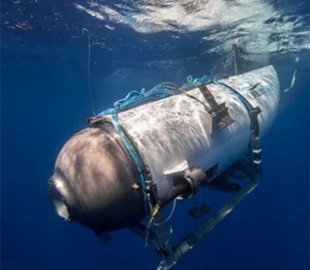
OceanGate, the company that organized tours of the sunken Titanic and whose submarine exploded during the dive , assigned work positions to passengers.
This is how it tried to circumvent federal regulations for passenger ships, reported in The Washington Post.
OceanGate charged six-figure sums for diving to the wreck of the Titanic on his experimental ship “Titan”.
According to the testimony of a former employee of the company, Amber Bay, the passengers received the title of “mission specialists”. But their work was not “specialized” – they held wrenches in their hands and counted the fish they saw.
“This is clearly an attempt to circumvent American passenger regulations,” – said Karl Stanley, head of the Stanley Submarines tourism business in Honduras, which dived on the Titanic.
According to Bay, the passengers did not receive salaries, company shares or health insurance. On the contrary – they paid for their stay at Titan.
OceanGate co-founder Guillermo Zonlein said that submarines were divided into three categories:
- recreational – transported only the owner and his guests, who did not pay for anything;
- passenger – carried clients who paid for the dives;
- research – carried owners along with crew and researchers.
According to Zonlein, passenger ships had the most regulations that the company tried to avoid in order to remain profitable.
200% Deposit Bonus up to €3,000 180% First Deposit Bonus up to $20,000He stated that OceanGate came up with many options to get people on board without calling them passengers. One was to give customers a stake in the company. Another involved paying passengers a dollar to be considered crew.
The company also considered calling its submarine a research vessel. This definition was broad enough to include people who are training, studying or assisting researchers.
However, she stopped at “mission specialists”.
Carl Stanley also reported problems with the ship's hull. He descended to a depth of 3.6 kilometers during the first dive on the “Titan”. Stanley was part of the second crew after CEO Stockton Rush made a solo dive.
Before the dive, Rush warned those on board of a loud noise. According to Stanley, then he was able to recognize the source of the sound – carbon fiber hull that broke under water pressure.
In addition, OceanGate did not submit “Titan” for classification – a voluntary process that is standard in the underwater tourism industry. Classification companies work with manufacturers of submarines at the design stage and check them during operation.
Recall that OceanGate's Titan submarine embarked on a private mission to the wreck of the Titanic in June 2023. On June 18, contact with him disappeared.
There were five crew members on board the “Titan” – billionaire businessman and researcher Hamish Harding, Pakistani businessman Shahzada Dawood and his son Suleman, French researcher Paul-Henri Narjolet, as well as OceanGate executive director Stockton Rush. submarine. They testify that “Titan” has undergone a “catastrophic implosion” – that is, an explosion directed inwards. Pressure was probably the cause of the collapse.
On July 7, 2023, OceanGate ceased its activities.
